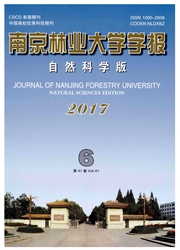

 中文摘要:
中文摘要:
研究了树脂酸钠在Ca^2+存在下的溶液浊度变化特点,分析了不同反应温度、溶液的pH、ACS用量及添加顺序等工艺条件对多价金属离子络合剂ACS控制树脂酸钠的影响。结果表明:游离的树脂酸钠盐能与Ca^2+进行离子交换,生成疏水且易聚集的树脂酸钙。ACS能通过吸附溶液中的Ca^2+而有效控制树脂酸钙的形成。提高温度和pH,降低溶液的初始浊度,有利于ACS对Ca^2+的吸附。无论在树脂酸钙形成前或形成后添加ACS均对树脂酸钙的形成有控制作用,但在树脂酸钠接触Ca^2+前使用ACS更有利于防止树脂酸钙的生成,且ACS用量可以降低一半。
 英文摘要:
英文摘要:
The turbidity change characteristics of sodium resinate solution was studied at the existence of calcium ions. The effect of ACS, a kind of heavy metal ion complexing reagent at different temperature, pH, dosage of ACS, and adding order on the solution turbidity was investigated in this paper. It was found that calcium resinate, a hydrophobic and easy aggregating compound was formed by ion exchang between sodium resinate and calcium ion. Formation of calcium resinate could be inhibited effectively by means of absorbing calcium ion in the solution with ACS. And it was useful to adsorbing Ca^2+ and decreasing the beginning turbidity by raising temperature and pH. Either ACS was added before or after resinate sodium filling, it had excellent function of transferring Ca^2+, and the dosage of ACS needs only half adding in the former.
 同期刊论文项目
同期刊论文项目
 同项目期刊论文
同项目期刊论文
 期刊信息
期刊信息
